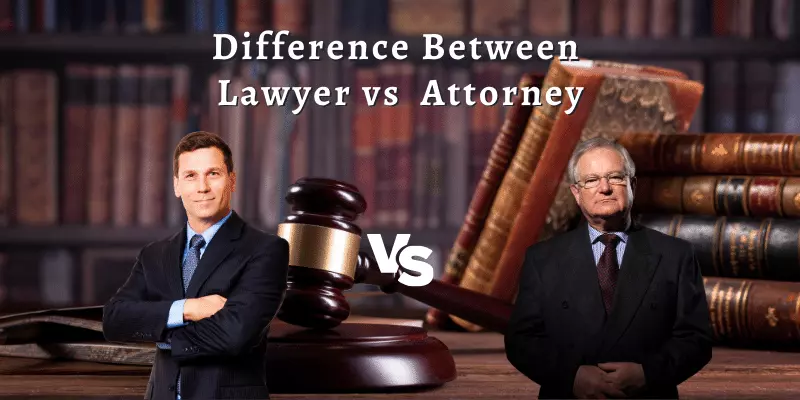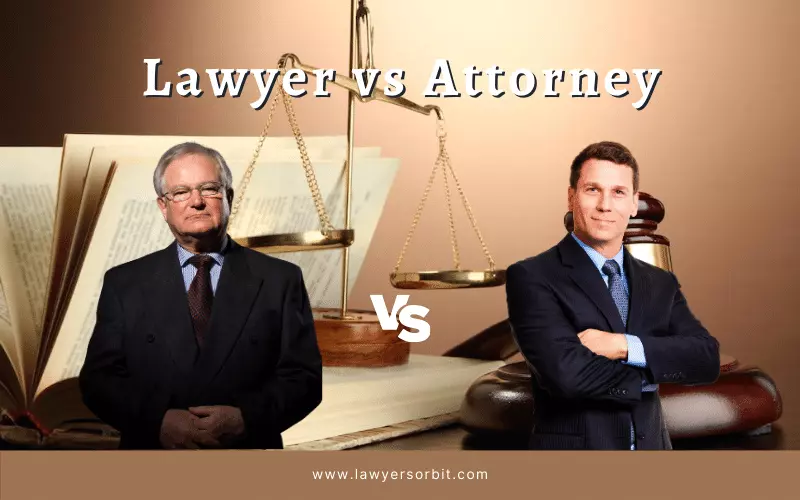Want to know about Lawyer vs Attorney? You are at the right place Know who is best for you. In the US, the terms attorney and lawyer are usually used interchangeably. Thus, people inside & outside of the legal field sometimes ask, “Are a lawyer and an attorney the same thing?”.
Well, it is expected to call an attorney a lawyer, as the terms are usually used interchangeably. However, did you know that there is a difference between the legal professionals of an attorney and a lawyer? The difference is quite significant to the United States bar association; therefore, you need to use the terms accurately. It may even matter to your customer who is searching for legal professionals for legal services.
Most people hire a legal professional/legal representation or a qualified practitioner to confirm higher chances of winning. In case you are in this dilemma, then you are likely wondering whether you should be employing an attorney or a lawyer to handle all your legal issues, so it is noteworthy to understand the distinctions.
So, here we have gathered information on the differences between an attorney and a lawyer. Let’s have a look to know the differences below.
What Is a Lawyer?
It is pretty simple to answer. A lawyer is a person who has finished a course of a particular legal training at a law school. This course generally involves 3 years of full-time study after an undergraduate degree.
In case a law school student does not take the state’s bar exam or in the case takes it, however, fails the exam, this does not mean they can’t use the learning they acquired in law school. Rather, many such people work outside the law in different sectors, including business, government agencies, and other legal professions.
However, a lawyer without valid membership in the state bar can’t represent someone in court or any other legal proceedings. In case a lawyer tries to do this, they can get charged with unlawful practice of law even after having a law degree.
What Is Attorney?
As per the attorney definition, an attorney is a person who has finished the educational and training requirements of the state bar association to take the state bar exam as well as has passed that exam and then carried out an oath as a member of a state bar association.
Attorneys have the right and a license to practice law after attending law school. He or she may be a member of over one state bar association—particularly in case he or she practices near a boundary between 2 states.
An attorney’s specialties differ and may need membership in a particular bar, for example, the patent bar for a patent attorney. As a state bar association member, further duties of the attorney include analyzing federal & state laws, using their learning of law education to meet the requirements of their clients’ requirements, and keeping detailed records that summarize their dealings with legal services, clients, and also other legal professionals.
These standards and rules deliver approaches for how an attorney should conduct their law practice, for example, attorney advertising, maintaining client as well as attorney-client privilege, private funds separate, and keeping reasonable contact with the client about the progress of the case.
Offenses of these practices can cause charges against an attorney by the state ethics board. This may take different disciplinary measures against an attorney, including suspension, disbarment, or reprimand.

What’s The Difference Between A lawyer vs attorney:
Like the difference between the portrayal of an attorney vs a lawyer, the differences between the duties and roles of both legal professions are significant to know. As mentioned, both are trained & educated in law schools formally, but how somebody uses their education & training is usually a key distinction between a lawyer and an attorney.
Although a lawyer is somebody who has completed law school as well as passed the state bar exam, you do not have to practice law (federal and state laws) in court to be regarded as a lawyer.
A lawyer may work as an advisor or consultant. Many prefer to practice law in a particular field, for example, real estate law, tax law, or immigration law, where they can provide legal advice to their clients.
On the other hand, an attorney practices law in court after completing legal education. Passing the state bar exam is a need for an attorney, providing them the liberty to practice law in a distinct jurisdiction. Similar to a lawyer, an attorney is needed to abide by the code of ethics as well as may practice law in both criminal and civil courts.
Main Differences Between an Attorney And a Lawyer
Attorneys are always lawyers but not all lawyers are not attorneys. Here is why:
- An attorney should have completed law school and passed the bar exam, and then will practice in court after graduating.
- Anybody who has completed law education from a law school can be known as a lawyer.
- Lawyers usually provide legal advice as well as do not practice in court.
Resemblances Between Attorneys & Lawyers
Lawyers and attorneys have to complete lay school with the same education and training requirements. They’re usually needed to take a J.D. (Juris Doctor) degree from an ABA (American Bar Association) accredited law school. Generally, these are known as post-graduate programs in the US.
Both attorneys and lawyers have been accepted to the bar as well as may practice by representing cases and clients in a court.
Attorney vs. Lawyer: What’s the Difference?
There are some extra, more distinct differences between these two professions. These differences are worth noting. So, we have discussed the differences below.
Roles & Responsibilities
The critical role of attorneys is practicing law after completing the study. However, there’re many more responsibilities and roles that attorneys take on. Below are the basic roles & responsibilities of attorneys.
- Attend every pretrial hearing to define clients and cases in a court
- Gather retainers from a client and manage contracts to support the case
- Provide legal support & legal guidance to the client
- Advise client on the best conduct while charges aren’t cleared, including confessing to friends and family as well as social media usage
- Meet with the client to critically consult the pending charges as well as plan on the best way to defend the charges
- Finding solutions to lawful matters
- Plan on how to settle the cases in a cost-effective and favorable manner
- Communicate with clients to know their legal concerns & needs to provide them with proper advice
- Enlighten the client about legal alternatives
- Staying upgraded on existing legislation
- Develop perfect arguments and define clients in criminal and civil legal proceedings
- Build loyal relationships with client
- Assist client with the implementation of agreements
- Draft legal documents like pleadings, contracts, and dispositions in an accurate and timely manner
- Research to collect pertinent data for each case
Qualifications
One of the most important differences between an attorney and a lawyer is the rights they hold. Although both attorneys and lawyers will have completed law study from law school, generally with either an LLB degree or JD (Juris Doctor) degree, attorneys will require to pass extra exams as well as gain an extra qualification on top of this.
Salary Package
Although an attorney is more qualified than a lawyer because of their bar membership, it is unclear who gets paid more.
This’s because there’re so many diverse jobs for lawyers and attorneys, and those jobs vary considerably depending on where they generally practice, years of experience, what they specialize in, and how far they have progressed in their careers so far.
Visit Here: and Know About How Can an Attorney Help You?
BOTTOM LINE
The main distinction in the lawyer vs. attorney comparison is the capability to practice law. Representation of cases is what makes lawyers into attorneys, provided they’re licensed to perform that by ABA.
Thus, attorneys have more mixed job prospects than lawyers who aren’t part of a state bar association since many jobs need candidates who rightfully passed the bar exam.
So, both attorneys and lawyers have learned the law to provide legal advice, however, not all lawyers are capable of fulfilling the responsibilities of attorneys.
Lawyers may not practice law in court as well as may not have steady clients, but you can confer with lawyers for legal issues that apply to the lawyer’s jurisdiction.
Hope, our article cleared all your doubts. Keep us supporting by reading and sharing our content!

Frequently Asked Questions (FAQ)
Is an attorney higher than a lawyer?
To describe an attorney, you should understand that lawyers are a more general term for an individual who has completed law school or received a Master of Laws degree after graduating. When a lawyer wants to practice law in court, they should take and pass the state bar exam. Thus, the lawyer will get a license to become an attorney as well as represent cases in court and legal proceedings or can provide legal counsel.
Are lawyers and attorneys the same?
No. For general objectives, a lawyer and an attorney are the same in the U.S. Nevertheless, from a professional perspective, there’s a slight difference between attorneys and lawyers. Although both attorneys and lawyers are law students who provide legal advice to clients and other legal proceedings or legal professions, they aren’t the same.
Attorneys have taken as well as passed the state bar exam on representing clients in courts since they obtained licenses in the judiciary. On the other hand, a lawyer who hasn’t the state bar exam can just take an advisory role.
What exactly do lawyers do?
A lawyer, who centers around the legal profession, counsels clients on legal obligations and rights. He or she can analyze laws, apply them to distinct situations, as well as draft new laws.
Who is called a lawyer?
A lawyer is generally a licensed legal professional who advises clients and offers advice to others’ legal matters. Unlike attorneys, they can’t represent clients in court. So, not all lawyers are attorneys but all attorneys are lawyers.
What’s attorney mean?
An individual with all the legal privileges to act for a client or case in court is called an attorney. You may appoint attorneys to act on your behalf in the court. An attorney has all the knowledge, practice, and license to represent clients in court.
